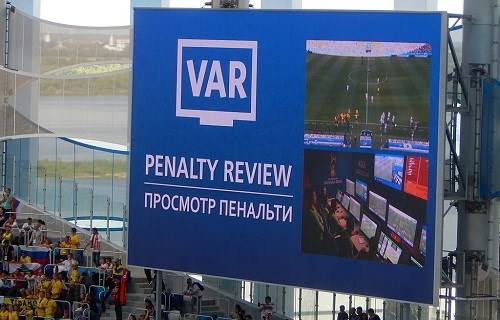Comment
Sports – Merely a vehicle for passive entertainment?

Has FIFA gone too far in catering to the public demand for an absolute truth and an obsession with reliance on technology for virtually everything we do, asks Christer Ahl. Photo: Oleg Bkhambri (Voltmetro)/ Wikimedia
04.07.2018
There was a time when a sports event was something very different from a pop concert, an opera performance or a circus act. But now that difference has gradually been blurred. It is all about entertainment, possibly except when excited parents get caught up in a football game or a running competition for their own young children.
Of course there are still fanatics, who watch a game totally concentrated on the actions of the athletes, admiring the finer points, and perhaps keeping detailed statistics of it all. But judging from my attendance at events in different sports and at different levels, I have concluded that for most people it is just another form of entertainment, an opportunity to socialize, to have fun and to act a bit ‘crazy’. Do not get me wrong: there is nothing wrong, in our often stressful lives, to seek relaxation in every way possible. But it is sometimes a bit frustrating, at least to me, to see that the athletic action on the court or field does not matter so much. Even the food and beer seem more important…
I believe many still feel that sports have an intrinsic value in promoting physical activity, teamwork, sportsmanship and healthy lifelong habits. Most other forms of entertainment cannot claim the same. So is it not important then to retain a notion that sports should be a bit different? I also worry that many other developments have contributed to, or have been caused by, a dilution of the concepts which are fundamental to traditional sports competitions.
For instance, as I have noted before, on this web page or in Play the Game conferences, the importance of fairness and a ‘level playing field’ seems to have been diminished, when the emphasis is much more on entertainment than on ensuring that ‘may the best team/athlete win’. Who cares a lot then if there is a likelihood that unfair (and even illegal) advantages are sought by some of the participants? For instance, does it matter that the complexity of doping and its detection does not rule out that we may be seeing abusers in the event we are watching? And are we even concerned about the possibility that the outcome of the game we are watching has in fact already been ‘fixed’?
Probably, it is even less likely that spectators worry about what is going on ‘behind the scenes’. So what, if the governing sports federation is totally corrupt and cares only about power and self-enrichment, not about the well-being of their athletes. The obvious risks for brain injuries in some sports must be concealed, because hard hitting is an indispensable part of the spectacle. And the possibility of physical and other forms of abuse of vulnerable young athletes is a distant or unknown issue when we are there to enjoy an event. They all look so happy and full of energy, so what problem could there be?
Along another dimension, involving technology, I know that e-sports was presented in the Play the Game conference last year. Sorry, but having discussed and observed with some young friends who are already totally hooked, I cannot see that this has much to do with sports at all. I certainly recognize it as entertainment, but for me this is just a special form of video games. Like others, it does involve motor skills, coordination and modicum of physical activity. But so do many other things in life that we would never dream of describing as sports. The only positive thing I see is that it is a better form than games involving gratuitous, mind-numbing violence. But I worry that, as just another form of entertainment, this regrettably could become a substitute for real sports activities.
Apropos technology, I think the current football World Cup has awkwardly illustrated that, even if I have argued that spectators often ignore the concepts of ‘level playing field’ and ‘may the best team win’, with technology we now have a real obsession with 100 % ‘correct’ decisions. Leaving aside all the obvious process flaws, even in these days of ‘fake news’ and ‘my own facts’, people tend to forget we often cannot find the absolute truth. A football game has a few ‘objective’ referee decisions: did the ball cross the goal-line, did the foul happen inside or outside the penalty area, and was it off-side? But the majority of the decisions are a matter of subjective judgment! So in my view, FIFA has gone too far in catering to the public demand for the absolute truth, “now that we have the technology”.
You might think that this ‘public demand’ contradicts some of the assertions I have made above. (and I know I have been a bit categorical, mainly for the sake of argument and debate). So it would make me happy if this offered a glimmer of hope that we are not quite moving away from the special meaning of sports, even though we mainly see it as entertainment. However, for me it is more an indication of our increasing obsession with reliance on technology for virtually everything we do. What do you think?





